The Penis in Women?s Spaces, the Cotton Ceiling and the Definition of Womanhood
 Photo by Mikayla Mallek
Photo by Mikayla Mallek
Before We Begin
A note on virtue-signaling & callout culture:
Far too often I see an otherwise-good article or YouTube video derail into shaming and virtue signaling. The holier-than-thou posture robs the piece of any value. Something that could?ve been great advice turns into sanctimonious finger-pointing. The problem with this is that the very people the author aims to reach with their plea – the people most in need of that message – are the most likely to shut down, get defensive and reject the whole premise when such callout language is used. It is my fervent hope in writing this article that I?ll manage to escape this trap; manage to communicate my points without positioning myself as “a better human” (I?m not) or making anyone feel defensive. All of this is simply an invitation to reflection and a plea for more dialog on the topic.
A great model I?m asking the reader to adopt is that of the “spinach in my teeth” metaphor put forward by Jay Smooth. If someone points out that a behavior is racist, bigoted or transphobic, you can think of it as someone pointing out you have spinach in your teeth. Rather than angrily fighting back, thank that person for their input, and go check in a mirror. You might actually have some dark green on your pearly whites. And, rather than feel ashamed, simply remove the spinach, and get back to the social occasion.
We?re living through times of great social change, and we?re all learning. Let?s all practice humility, solidarity and acceptance. Let?s learn from one another.
A Quick, One-Question Survey
*Trans women are women*
a. I agree
b. I disagree entirely! Transwomen are entitled men invading women’s spaces, and pose a threat to women.
c. I don?t fully agree – while I understand some men are very feminine and choose to dress and act as women, they?re still biologically men. I can humor them on pronouns, but that doesn?t magically turn them into women.
- If you?ve answered A, please read on.
- If you?ve answered B, please click here.
- If you?ve answered C, please click here.
The Women?s Circle
In a grassy area by the river, twenty women stand in a circle. They?re in a women?s retreat; they?ve gathered for a radical body-positive exercise. The exercise centers on the Yoni (the Tantric word for a woman?s genitalia), and will include nudity and self-exploration.
Nineteen of these women are vulva-clad, vagina-equipped natal, cisgender women. One of these women is trans. While she might not refer to her genitals by the words ‘penis’ or ‘testicles,’ that?s what they are anatomically. And, though transformed by several years of female hormones, her genitals are likely to be understood as “male genitals” by most women present.
This is the challenge we face: Do we allow the trans gal to participate in the exercise (which includes shedding all clothes and touching one?s genitals), or do we specifically exclude her, for fear of triggering one or more of the other women?
As a facilitator of SexPositive events, I?ve agonized over this question. (It doesn?t help that I happen to be trans myself.)
I?ve recently reached out to my friend Jimena Alvarado, PhD. A Portland-based professor of feminism and social justice (what used to be called ‘women?s studies?), Jimena was happy to dissect this with me.
“My predisposition is always to lift up the voices of the most marginalized,” Jimena told me.
From Jimena?s model, excluding the trans woman is untenable. So it becomes a question of managing the expectations of the other participants.
“It?s up to the organizer, the event leader;” Jimena said. “They should have framed the event in such a way that all present understand and agree with that inclusivity.?
Trans Women And The Danger of A Single Story ? Where Chimamanda Got It Wrong
On the importance of being seen, the many narratives of women, and the toxicity of exclusionary thinking.
medium.com
Genitalia and Oppression
We talked about the symbology of the penis. Jimena and I immediately agreed that penis-owners have historically hurt vagina-owners in many ways. Some of these ways have specifically included the penis as a weapon, as an instrument of harm. Some of the women in the circle could be survivors of rape or sexual assault. So it is really important to start by openly acknowledging that history, and that symbology. And by directly addressing those concerns.
The event leader can explain that, while there is an obvious similarity between a trans woman’s genitals and those of a man, this person’s genitals have received years of female hormones. They respond differently, they carry a different energy. While a man’s penis is an object of great pride, a trans woman’s member is often a source of dysphoria and shame. A man’s penis swaggers and struts, conquers and acquires, penetrates. A trans gal’s genitals generally carry none of this energy. Speaking in generalities, a man’s sexuality is urgent and assertive, and can be invasive. A trans gal’s sexuality is docile, patient, hesitant, fragile. (Note: An acquaintance asked me to emphasize I?m speaking in generalities here. You may find men who are shy, docile and/or passive with their penis. You may find trans women who are comfortable using their genitals for penetration. As with anything, YMMV ? but I?m speaking from having spoken with dozens upon dozens of trans women.)
Hopefully, such explanations can put the other women at ease that the trans gal is just another woman ? albeit one with an odd-looking Yoni.
Kicking this around with another cis gal ? a human rights activist ? yielded another gem: if we started excluding whole demographics because of abuse we experienced from humans with similar features, we could find ourselves excluding a whole race, or everyone with blue eyes, or all ectomorphs, etc.
The Gym Locker Room
A common scenario used by trans exclusionists is the women?s locker room at the gym. it might be startling or upsetting for a woman to see a naked person in the gym locker room, and to find that person has a penis.
One gal recently told me that her first day at her gym she walked into the locker to be immediately confronted by a very naked 70-year-old (cis) woman. And that was startling for her. I asked her what could have made the situation better. She said, “well, the old woman could have covered up.” Then she added, “or, I could have fewer hangups about the naked human body.”
I invite you, the reader, to consider things you might encounter in the gym locker room that might be startling. A naked trans woman? A naked old woman? A naked handicapped woman? An amputee? A little person? An obese lady? A person of a different race?
I?m not judging you. Several of these would startle me. And I would work through it, and try to consider it a growth experience. I hope you wouldn?t be the person that goes to the manager and says, “uhm, excuse me, but there?s a woman in a wheelchair in there, and it?s making me uncomfortable. Can you ask her to leave?”
(You might find these analogies to be invalid because a penis indicates the person is not a woman. If so, please click here.)
(Here?s Galen Mitchell?s satire, ?How to identify trans women at the Gym?)
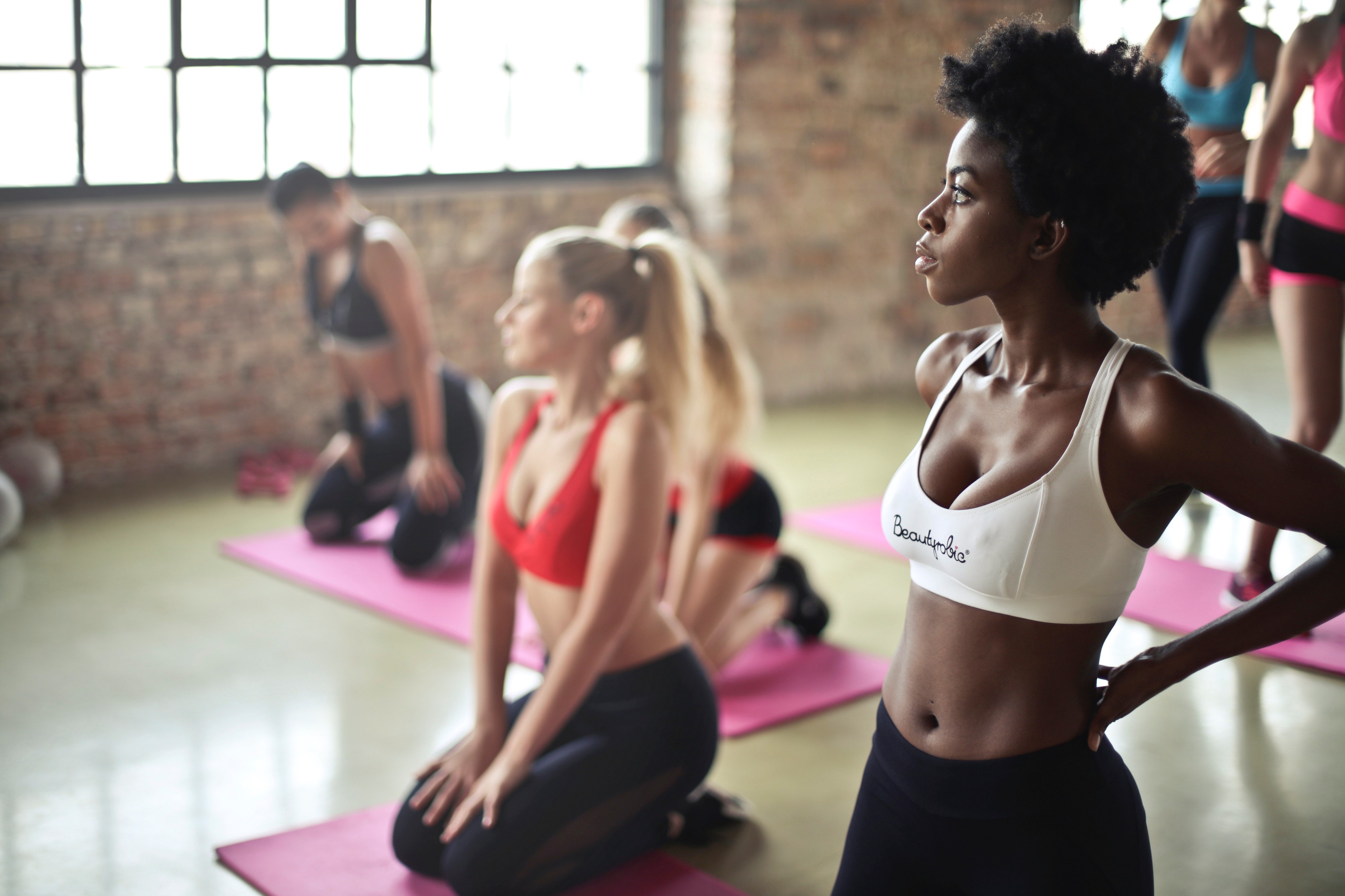 Photo by Bruce Mars
Photo by Bruce Mars
The Cotton Ceiling
The term “cotton ceiling” was coined by porn actress and trans activist Drew DeVeaux in 2015. It?s been used to refer to the tendency by cisgender lesbians to outwardly include and support trans women, but draw the line at considering ever having sex with them.
Several trans activists have very lucidly addressed the various prejudices that play into this position. I believe Riley J. Dennis nails it here:
Sadly, I?ve seen at least two YouTube responses from TERFy vloggers who profoundly (and maliciously) twist Riley?s words to connote an obligation to sleep with trans women. If this has occurred to you, please stick around.
The point of such discussion is not, EVER, to exhort anyone to have grudging sex without enthusiastic consent.
The point of such discussion is to exhort folks to examine their inherent discriminatory prejudices (bigotry). And before you get all bristly on me, I will confess a few bigotries of my own: had you asked me five years ago, I would?ve told you:
- I would never date an Asian;
- I just don’t find trans men attractive;
- I wouldn’t consider a trans woman “relationship material”
Times have changed, and I have grown. I am presently in a serious, committed relationship with an Asian Enby (non-binary person). I think Jake Graf is hella sexy. And I would absolutely date a trans woman (my partner and I practice ethical non-monogamy).
What?s changed? Mostly familiarity and proximity. And also, one hopes, I?ve grown as a person. I?ve humanized such folks by getting to know a few, which led me to challenge and re-examine my prejudices and fixed ideas. I?ve challenged my internal stories for people depending on their looks.
I wish I could include Avery Faucette?s full article at Queer Feminism here – but I?ll just drop this one paragraph (and urge you to read the rest):
I pinned a misogyny that at the time I attributed to almost all men onto trans women, as well. I assumed that sex with a trans woman would be penetrative and violent, that I wouldn?t have the camaraderie with a trans woman that I felt at the time with many cis women, that female history was somehow very important. I didn?t think about what a trans female experience might be like, or what a trans woman?s relationship to her body might be. I was pretty naive about sex. I put a lot of stake in body parts because I was fumbling with my own gender, body, and sexuality. I said that I was against transphobia but knew no openly trans people.
The OkCupid blog once reported that Indian men fare the worst on that site. A Redditor invited conversation on that, and some answers pointed out stereotypes (“Indian men tend to be geeky, and socially awkward”), and some brought up legitimate concerns (“Indian men are pressured to marry Indian women, and may only be biding their time, in dating American women”).
The point was not that we are all immediately obligated to bed an Indian, lest we be branded bad people. The point was to consider to what degree social prejudices and lack of representation are impacting our psyche.
I would?ve never dated an Asian. Why? I had these perceptions of Asian cultures that intimidated me. I considered Chinese culture a cold culture – not nurturing. Perfectionists. Performance-driven. Unforgiving. And I?m a sloppy mess, NOT detail-oriented, forgetful and unorganized. I would feel exposed and vulnerable. So a lot of these fears were a reflection of my own insecurities.
Having now had plenty of time to challenge these stereotypes, I can tell you, in some ways I was just being racist. And also, reductionist ? even if there?s a cultural ?vibe? to a group of people, what might be true of folks in Hong Kong might not be true of Beijing, and what might be true of Northern China may not apply to the South, just like Albany, NY is not the same as Houston, TX. (And of course, Asia is a vast continent, and China is just one of many countries in it.)
And in some ways, my fears about cultural differences were founded, and we had to overcome some cross-cultural challenges. There are things I take for granted about ?the way humans do things? which are entirely based on my Buenos-Aires childhood in a Russian community, and there are things my partner assumes about ?the way it is with humans? based on their Seattle childhood in a Chinese-American community.
I once got in the car of an OkCupid date and the first words out of their mouth were, “I don?t date people whose skin is darker than mine.” I thought this was an odd things to tell me ? my skin was lighter than hers. So, not only racist, but gratuitously racist. (Only years later I understood West-Indies colorism.)
Now, you might be thinking none of these analogies are apt because trans women who still have a penis aren?t really women. If so, I invite you to click here.
 Photo by Matheus Ferrero
Photo by Matheus Ferrero
A couple of years ago I had casual sex with a goldstar lesbian. She was happy to engage with me, but drew the line at engaging with my genitalia. Since we?ve remained friends, I consulted her for this story. She said she was comfortable being with me because she feels comfortable with women. But she has zero desire to do things to a penis, so that was a hard stop. In hindsight, we both agreed it would?ve been good to have had some discussion about comfort zones and boundaries before getting into it. (As I recounted the story to a bisexual woman, she quipped, “but? she didn?t lick the booty? I mean, there are so many alternatives…”? And there are. I think we all tend to be limited by our imagination, at times.)
Some lesbians might be afraid of engaging with trans women because they might fear these gray areas???they might fear accidentally hurting a trans gal?s feelings. There?s a struggle with the unfamiliar. And some lesbians might not want to date trans women because they?re thinking about long-term commitment, and children. Trans women can?t birth children.
On the other hand, some lesbians don?t want to date women without a uterus because ?these are not fully women? (see this). See the difference between these two?
My best friend once told me that his parents, in 1970s Brooklyn, were dismayed that black folks were moving in. Not because they believed Black people were bad, but because it was driving depreciation of real estate on their street. Racism? Or simply a legit concern about savings?A mix of both?
There are a lot of nuances to such issues. And just to be very, very clear to all the TERFs who will inevitably write me to say I?m promoting rape culture:
I am NOT saying anyone owes anyone a roll in the hay. I am not saying anyone is entitled to sex. If you don?t want to bed a trans woman, you do you, boo.
I?m just inviting you to sit with this a while, challenge your prejudices, and hopefully expand your thinking a smidge.
 Photo by Jeremy Bishop
Photo by Jeremy Bishop
The Most Marginalized, or ‘Male’ Entitlement??
As my friend Jimena wisely says, lifting up the most marginalized is important. A rising tide lifts all boats.
Unfortunately, the mechanisms in our minds tend to react with alarm when we sense that our comfort is being challenged. When we?re sitting comfortably, have just laid down our purse and taken off our shoes and we?re asked to scoot over, sometimes we think, “wonderful, the more the merrier;” but oftentimes we might think, “what now?” and “Oh great, how many more? How tight is my spot going to get?” Or even, “they were late; I shouldn?t have to get up for them…” etc. Our sense of entitlement gets activated. “Hang on, are they even supposed to be here?”
It?s a human reaction.
Our society has somewhat of a pecking order of privilege. When a rich, powerful man demands to be heard, we tend to take it for granted. But when a poor man speaks, we might think “impertinent.” When a woman demands to be heard, we might think “bitchy.” If it?s a Black woman, some would say “angry Black woman.” (A few decades ago, it was “those people are getting too upitty”).
When a trans woman tries to be heard, the tool of choice to shut her up is that she?s speaking from ‘male privilege?.
It is true that many trans women have walked the world passing for men for many years. And it?s possible this colors some of our experience of the world. But trans women keep none of that privilege in transition – we instantly lose any of it when we come out. We lose so much. And, to a very large extent, we?re at your mercy. We depend on your solidarity and kindness.
The trans woman in the public restroom is not saying, “I?m here to invade your space!” – she?s saying, “please take me in, I have no other place to go.” We?re not conquerors or invaders, we?re refugees.
The trans woman in the public restroom is not saying, “I?m here to invade your space!” – she?s saying, “please take me in, I have no other place to go.” We?re not conquerors or invaders, we?re refugees.
 Photo by Kyle Loftus
Photo by Kyle Loftus
The Definition of Womanhood
One response I recently got to my article on misgendering says angrily that they won?t accept that trans women are biologically the same as cis women.
I completely agree my body is not biologically the same as that of a natal woman! I don?t menstruate. I can?t conceive children. I have no uterus.
Some would say that makes me less of a woman. Emotionally, I sadly agree. If we take all of the things that make a woman, the ability to birth children is a big part of it. I feel a deep sadness over my barren body. But principially, I bristle at the entitled, cruel and outdated notion that a sterile woman is “less than” anyone else.
Some would simply argue that I?m no woman at all. I?ve done my best to disinvite such people from reading my article.
As a society, we?ve been debating the notion of full personhood for some time. The Founding Fathers proudly spoke of equality, while writing a document that speaks only of MEN, and while owning slaves. Members of minorities have had to argue their humanity for centuries.
Now, we are arguing about ‘genderhood’ – for the right to live our lives according to our gender. You wouldn?t think this would need arguing, you wouldn?t think people would need convincing. You get to live life in the gender identity that rings true to you – you get to live life with a gender expression that doesn?t suffocate you. Don?t you wish the same for others?
You get to live life in the gender identity that rings true to you ? you get to live life with a gender expression that doesn?t suffocate you. Don?t you wish the same for others?
I Wasn?t ?Annoyed? At Your Misgendering Me
What you are saying to us when you refuse to acknowledge us
byrslf.co
Let?s be honest with ourselves – what leads us to build walls is fear. Prejudices lead us to fear other races – not too long ago, White people kept Black people from using the same bathroom. Keeping others out makes us feel safer. However, another way to feel safe, without being exclusionary, is to challenge our prejudices. Today, we would find it offensive and preposterous if a women?s bathroom excluded Black women, or handicapped women.
Science has proven gender is a spectrum. Science has proven gender is separate and distinct from biological sex. And even biological sex is much more nuanced then we previously thought. So, can we all adopt a measure of humility, and admit what we thought we knew might be wrong, or at least incomplete? Can we all adopt a measure of compassion?
Human rights are not cookies. You don?t lose some when I gain some.
And I?m not “erasing women” by showing the temerity of existing in this world. Women still exist, in vast numbers. Allowing trans women in the room just makes MORE women, not less (yay math). Allowing Asian, Black and Native American women to sit beside White women did not erase White women. Allowing trans women into women spaces will not erase natal women.
(If all of this is falling flat with you because you don?t think trans women are real women, then please click here.)
Anecdoche
I stumbled onto this word recently. It defines that condition when everyone is talking, and no one is listening. I see people expressing very polarized, angry views. I see people speaking from hurt, from fear and from hate.
Riley J. Dennis posts insightful, earnest videos, lucidly explaining her views. Only to have other women eviscerate her, twist her words, turn them into something ugly.
We?re all so angry. We?re all so hurt.
Recently, I wrote a story here on Medium about transgender children. A woman felt so aggrieved about what I wrote that she wrote a call to action on her Facebook group, imploring her 5100 members to write negative reviews on my public Facebook page.
The sad thing is that this woman and I agree about 80%, maybe 90% of things. We both want to smash the patriarchy. We both stand for reproductive rights. The only one disagreement we have is that she believes I should not exist. My very existence is an offense and a threat to her.
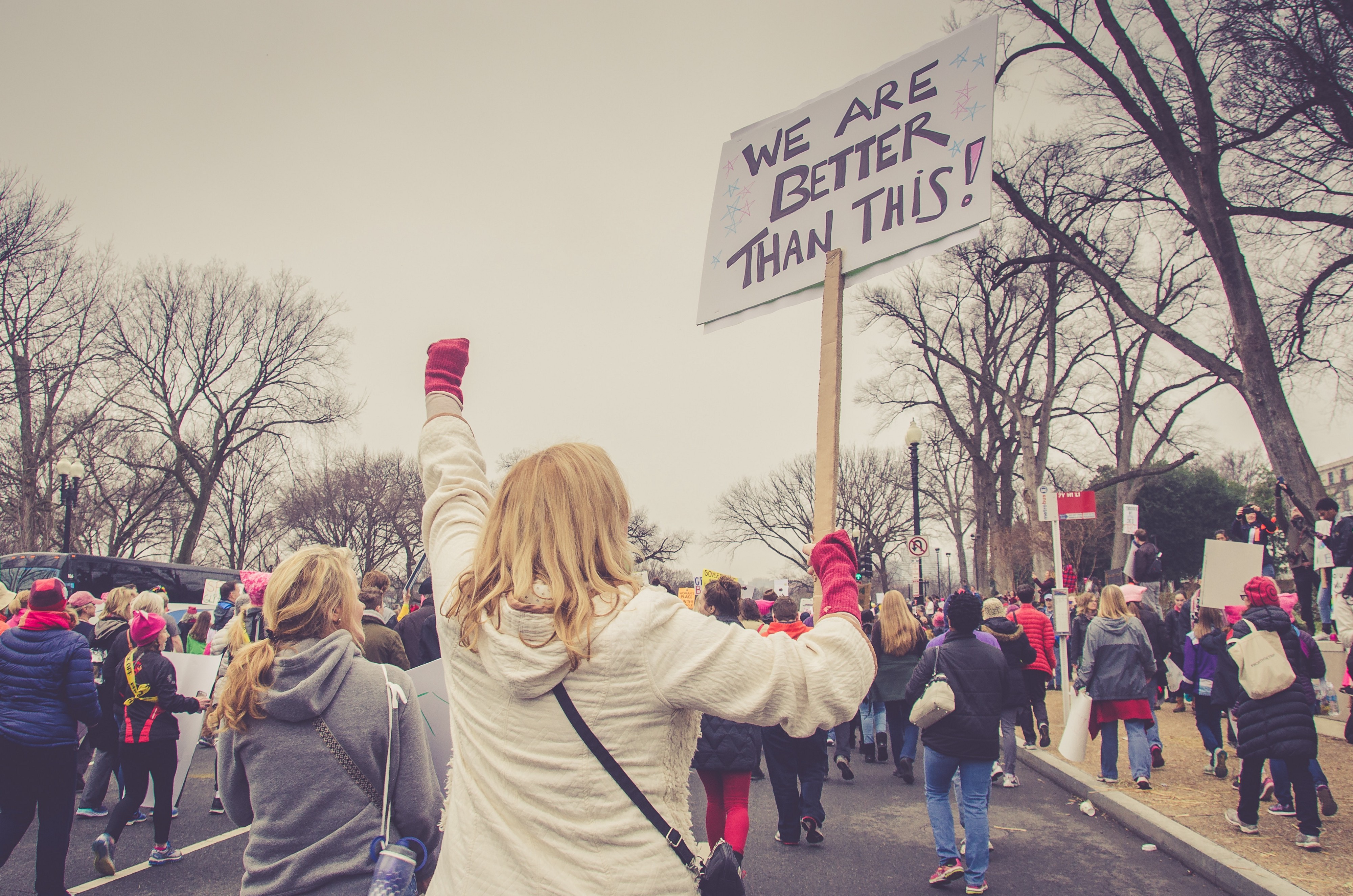 Photo by Jerry Kiesewetter
Photo by Jerry Kiesewetter
Cis Accountability, Trans Accountability
We can all do better.
Women who were born with female biology have a choice to make: To see trans women as a threat, as “invading men;” to make nothing of us, to support narratives that would oppress us ? OR, to stand shoulder-to-shoulder with other sisters (cis & trans) and say, “I?ve got you, we?re in this together, I?ll hold your hand.”
(This was the spirit of the #illgowithyoucampaign.)
It?s an important moral choice ? do you stand on your own biological privilege to push people away, to push people down OR do you accept a bit of discomfort into your life for the sake of another?
It?s an important moral choice ? do you stand on your own biological privilege to push people away, to push people down OR do you accept a bit of discomfort into your life for the sake of another?
Women who were born with male biology also have a choice: To stridently and angrily demand room at the table (thus increasing the discomfort and adding to the fears), OR to signal with every gesture, with every word, with every action “I am one of you. You can trust me.” Not by demand or accusation, but by solidarity, concern and genuine participation.
We are telling the world we are women. Let?s back those words with action. Let?s stand for all women, cis & trans. Let?s defend all women. Let?s protect all women.
Let?s stand for all women, cis & trans. Let?s defend all women. Let?s protect all women.
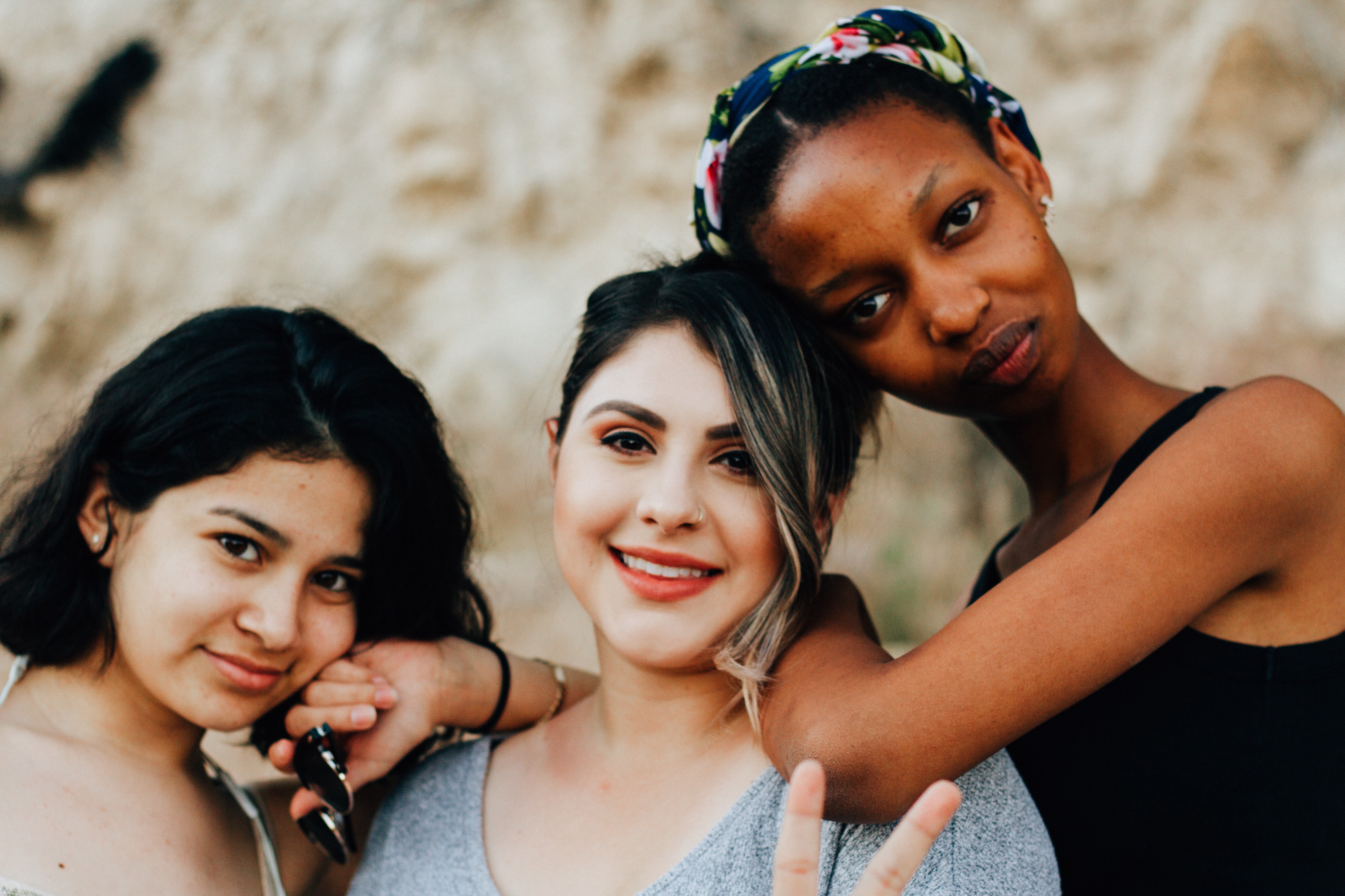 Photo by Omar Lopez
Photo by Omar Lopez
To My Trans Sisters: How We Show Up In Women?s Spaces
As we are welcomed into women?s spaces, I encourage you to show up with a good amount of empathy, a good amount of patience, and buckets of sense of humor. It?s integration all over again, just like Ruby Bridges going to school. It?ll take a couple of decades to break the cis/trans apartheid.
Sometimes our gender dysphoria is so urgent, our need for acceptance so great, our pain from social ostracism so present that we may come off as too needy. (“She?s so thirsty!”)
Sometimes we?ve been the targets of so much aggression that we?re over-sensitized and wounded. (“She?s so bitchy!”)
Sometimes we don?t take the time to understand every other woman in the room is hurting too. (“She?s so self-centered!”)
I beseech you, please show up with humility and patience. If a cisgender woman talks to you from privilege, acting entitled and expecting you to “mind your place,” resist the urge to get mad. It might not be malice, it might just be ignorance. Be gentle in correcting pronouns, explaining trans basics, correcting misperceptions.
Many would argue it?s not our job to educate folks. I say, for now, it is. We are a generation of activism. We are pioneers. (That?s why I?m typing away at4:20am).
Do the work. Make it safer for all the trans gals who will follow.
And please, in common women?s spaces, don?t just show up as a militant trans activist. Don?t just talk everyone?s ear off about trans issues. In common women?s spaces, prioritize the larger feminist subjects. Address reproductive rights. Talk about the wage gap. Care about domestic violence. Promote gender equality and gender equity. Challenge gender roles and gender stereotypes. Be a feminist. Women have been fighting an uphill battle for centuries. As a woman, please add your voice to the struggle.
(Read my thoughts on the Women?s March)
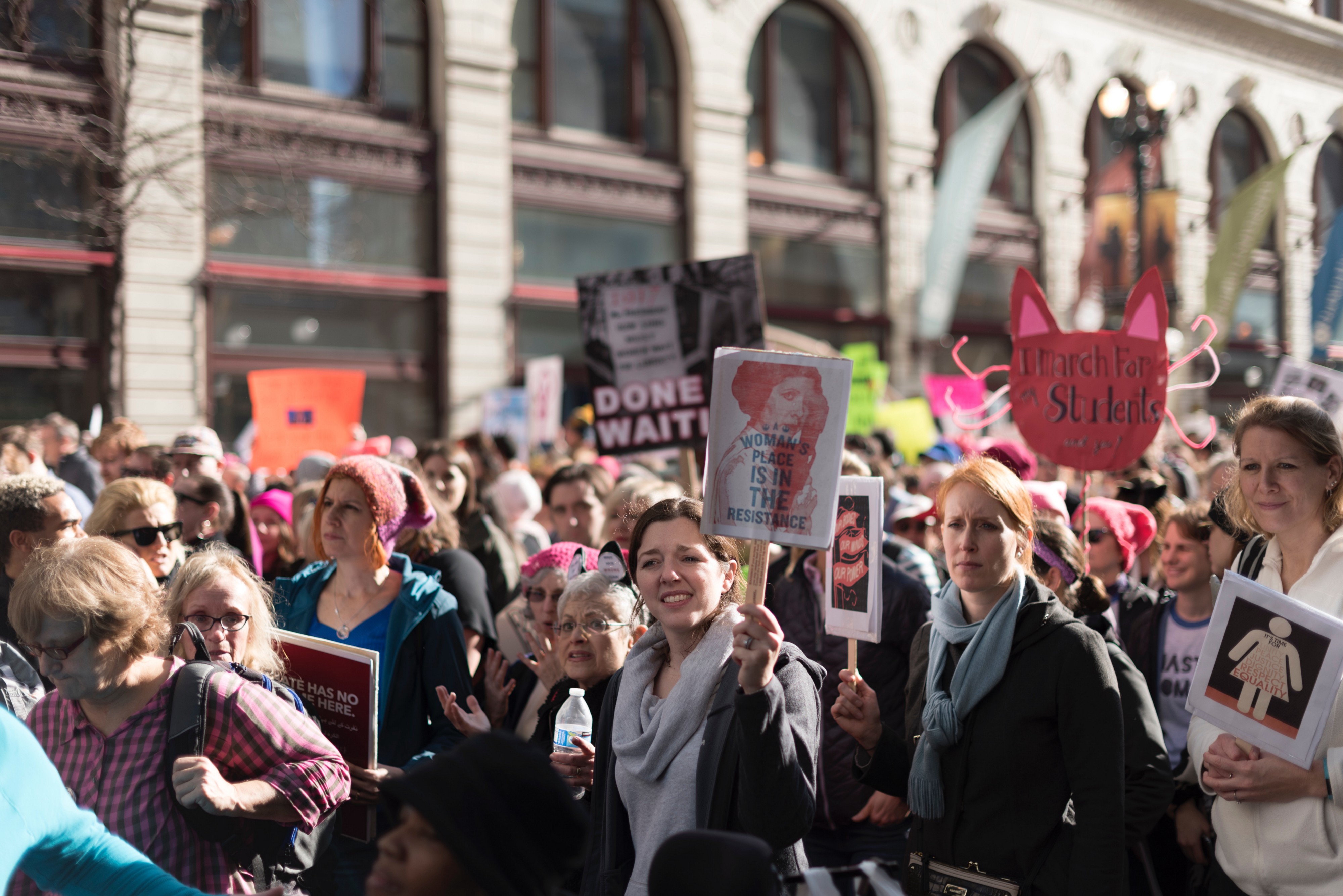 Photo by Josh Howard
Photo by Josh Howard
The Need for Open Communication
We can all stand to listen more. We could all be more compassionate.
Four years ago I asked my children to retire the term “dad.” It triggered my dysphoria, and led to stares from strangers. We settled on simply “Cassie,” which mostly worked… except folks would ask, “so, who?s Cassie? Who is Cassie to you?”
We tried a few things. We tried the awkward “my parent.” I didn?t love it.
Finally, in exasperation, I said, “I am your mother. I?m your parent, and I?m female. Don?t we already have a word for that?”
My daughter happily adopted that. My son balked, continued to use Cassie, and defines me to others as his “transmom.” It sort of works.
But around Mother?s Day last year, my co-parent (their biological mother) learned of this, and was very hurt. She lashed out in anger, “you are NOT their mother – and you never will be!”???which in turn hurt me enormously.
It took us many months, much struggle to come to dialog over this. And when we finally spoke, we both saw the other side. I assured her I did not mean to encroach, to infringe into “her turf.” She in turn assured me she was not questioning my womanhood. We empathized with one another. We cried. We learned.
A lot of pain could?ve been prevented had I had the foresight to sit down with her and discuss it openly, beforehand.
A lot of pain could?ve been prevented if she had seen that I was trying to resolve a legitimate challenge, and meant no malice or aggression.
This is a very granular, finite example. My point is that all these issues of womanhood, inclusion and intersectionality can be discussed with an open heart. And we can all live together, those of us with vaginas and those of us without them.
We can even go beyond uncomfortably tolerating – we can become friends. We can laugh together. We can support each other. We can show up for one another. We can be sisters.
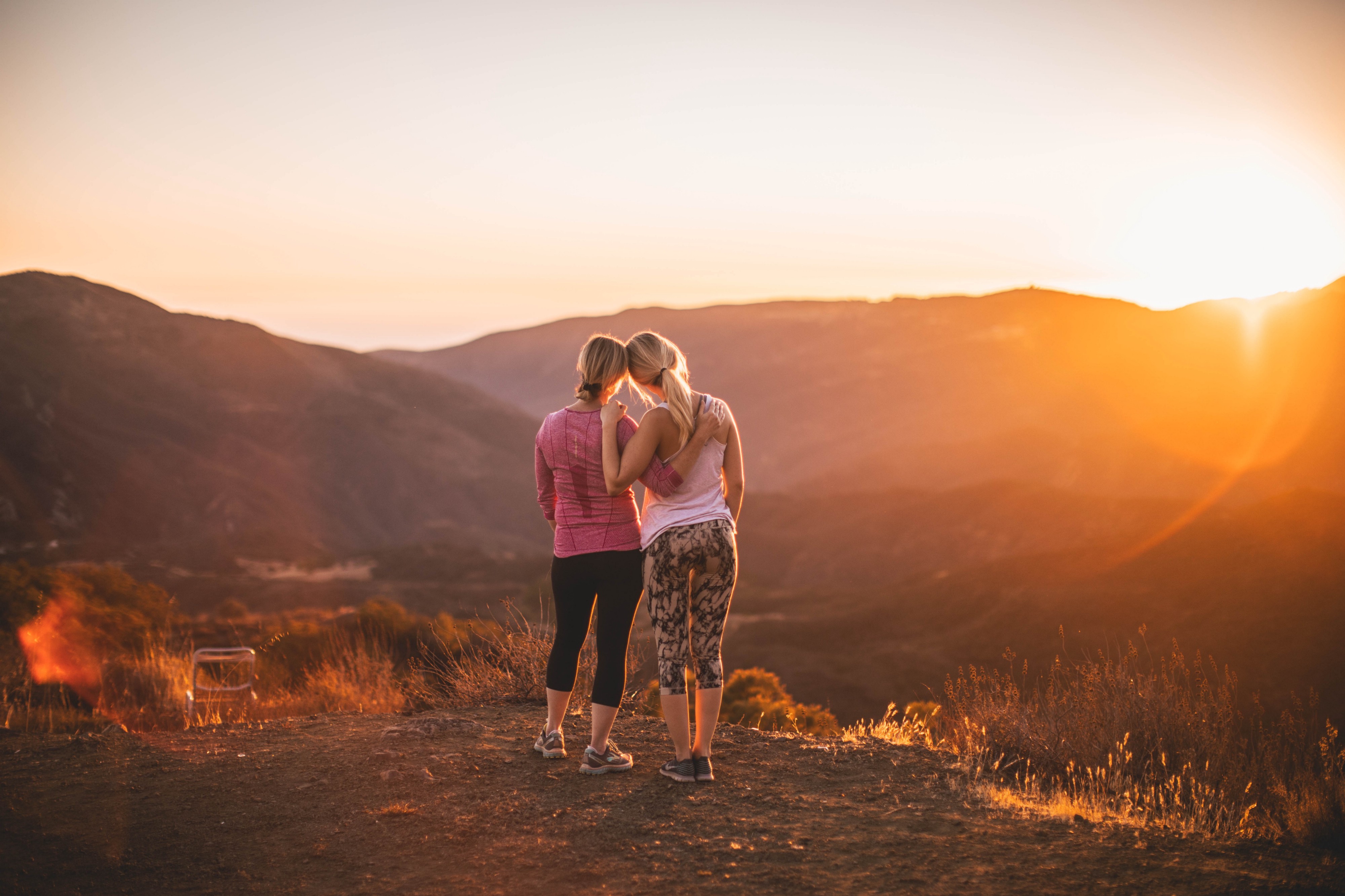 Photo by Roberto Nickson
Photo by Roberto Nickson Cassie Brighter 2019
Cassie Brighter 2019
May I please ask you to *applaud* it with a few claps (50 max)? If you think this is worth sharing, please use the share icon.
Read another story by Cassie Brighter:
Fuck ToleranceJust a Bad DateMen Need Clear InstructionsThe End of White Civilization An Open Letter To A Good ManWhat Do We Do About Wombs? Living My Best Life ? They Tell Me Why This Sudden Trans Kids Trend?I Wasn?t ?Annoyed? at Your Misgendering MeTrans Women & The Danger of a Single StoryThe Day I Invented a Religion for my ChildrenMen Need Clear Directions (a #MeToo conversation)Are lesbians Who Don?t Sleep With Trans Woman Bigots?Coming Out Trans To Your Children: A Step-by-Step GuideTales of Transition: The Landscaper and the Icecream ManTrans Women May Soon Give Birth ? a trans woman?s perspectiveA March for ALL Women: A Trans Woman?s Defense of the PussyhatWelcome, Welcome Cassandra! ? The Long Journey to Self-Acceptance


